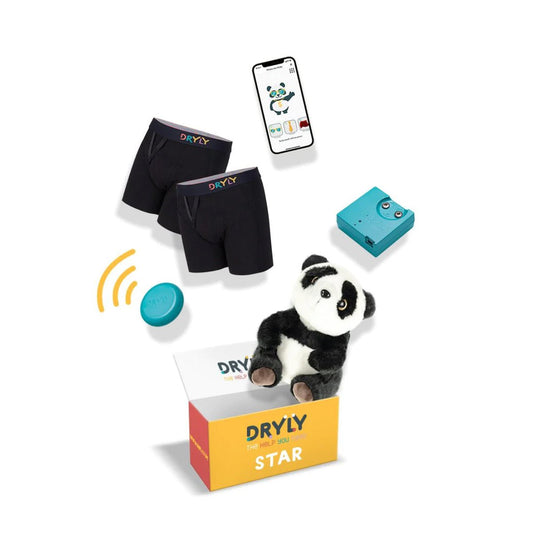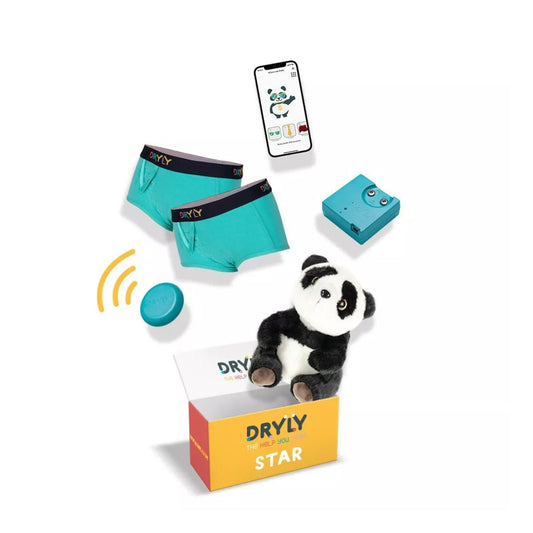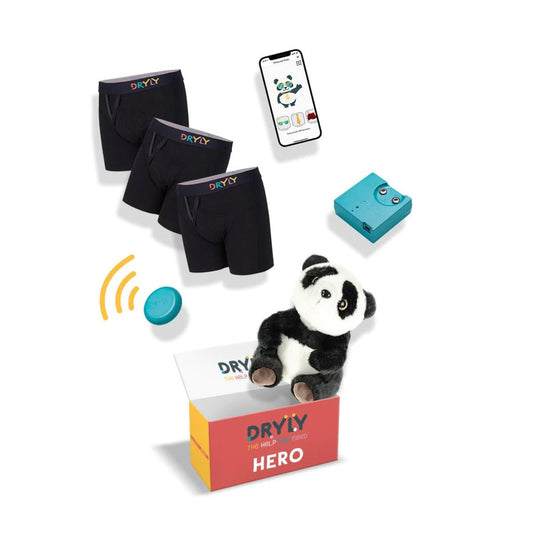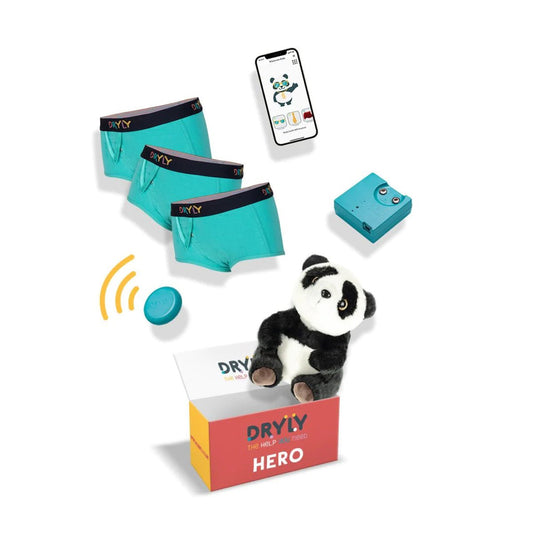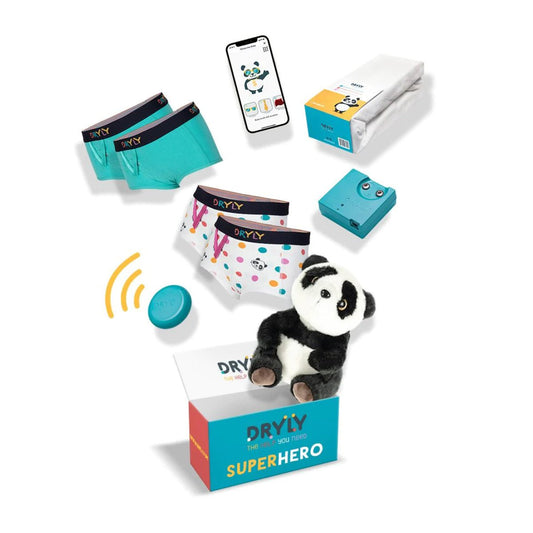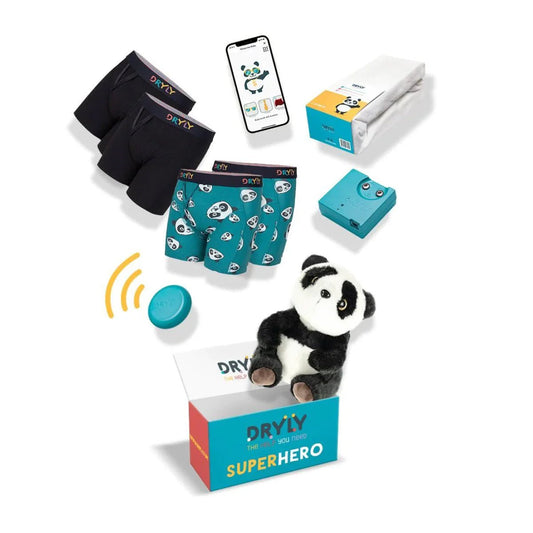Bedwetting Alarm Training
Bedwetting alarm training: the effective solution against bedwetting
Bedwetting can be an uncomfortable and frustrating problem for boys. Fortunately, there is a scientifically proven method to effectively address this problem: the bedwetting alarm. This method helps children better control their bladder during the night. In this comprehensive guide, you'll discover all about the bedwetting alarm training, how it works, why it's effective and how it contributes to a better night's sleep.
What is a bedwetting alarm?
A bedwetting alarm is a medical device that trains your child to wake up when he has to pee during the night. The alarm works with a transmitter that detects moisture; as soon as the transmitter notices a drop of urine, the bedwetting alarm goes off. This wakes up your child so he/she can go to the bathroom instead of peeing in bed. This process helps his brain make a connection between a full bladder and waking up. Over time, his body learns to do this process on its own, thus, the bedwetting alarm training ensures that children become potty trained within a time of 3 months.
Why address bedwetting with bedwetting alarm training?
Bedwetting is common in children, especially in boys. In most cases, this is due to deep sleep or an immature bladder. A bedwetting alarm training provides an effective solution because it trains your child to improve his/her bladder awareness during the night. With consistent use of the bedwetting alarm, over time he will learn to wake up on his own when he needs to urinate. This can ultimately lead to dry nights and increased self-confidence in your child. A bedwetting alarm from Dryly offers an innovative and proven method to stop bedwetting.
How does a bedwetting alarm training work?
A bedwetting alarm works based on a transmitter attached to the underwear, when this transmitter detects moisture it sends a signal to the receiver. The receiver then sets off an alarm. The alarm of the Dryly bedwetting alarm consists of the receiver and the transmitter, there is also an option to choose a transmitter with vibration function. This transmitter vibrates on the underwear so your child wakes up not only by the sound but also by the vibration. The bedwetting alarm training teaches his/her body to recognize the signals of a full bladder even while sleeping. So in time, he will get up to pee without an alarm clock.
From what age is a bedwetting alarm training suitable?
The bedwetting alarm training is generally recommended from 5 years old. This is often the age when children begin to gain more control over their bladder and learn to recognize signals to stop bedwetting . Children may still have trouble staying dry at night. A bedwetting alarm can help them speed up this process. For younger children or those with medical conditions, it is always wise to consult with a doctor before starting a bedwetting alarm training. Most importantly, your child must be ready to take responsibility and be motivated to stay dry.
The different modes of the Dryly bedwetting alarm
At Dryly, we offer not only a bedwetting alarm with sound, but also a transmitter with vibration function. For deep sleepers, this is of course an ideal solution to start the bedwetting alarm training. Thus, the child wakes up not only by the sound of the receiver but also by the vibration of the transmitter. In addition, for the more sensitive children, it is also possible to turn down the Dryly bedwetting alarm or even put it into silent mode. In this mode, the alarm will not sound and only the transmitter (if it has a vibration function) will vibrate and the parents will receive a notification in the Dryly app to wake up the child. So Dryly thinks of both deep sleepers and hypersensitive children.
Why bedwetting alarm training with Dryly?
Dryly is an innovative and playful solution for children to solve the bedwetting problem. Dryly's playful approach gives children extra motivation to solve the problem and finally become potty trained at night! In addition, the transmitter is made so that it is not perceived as a burden by the child, with a compact transmitter on the pants and an easy way to turn off the alarm Dryly thinks along with the child. Many parents have already experienced positive results with Dryly's bedwetting alarm training, Dryly has already helped more than 25,000 children with bedwetting problems!
Tips for effective bedwetting training
Using a bedwetting alarm requires patience and consistency. Here are some tips to optimize the process:
1. Be patient: It may take several weeks for your son to use the bedwetting alarm effectively, it always takes some getting used to in the first two weeks. Therefore, remain patient; every child is different and maintains his own pace.
2. Follow the routine in the Dryly app: In the Dryly app, a special routine has been created. Follow this every night so that there is consistency in the bedwetting alarm training.
3. Make use of rewards: Encourage your child with small rewards for dry nights, this can of course also be done in the Dryly App, your child collects coins during the bedwetting alarm training to dress the panda bear!
These three tips can contribute to successful use of the bedwetting alarm and ultimately dry nights.
The Bedwetting Alarm Training, the solution against bedwetting
Thus, a bedwetting alarm for boys offers an effective way to address bedwetting. By training your child to wake up when they need to pee, over time they can stay dry without a bedwetting alarm. At Dryly, we have a playful and innovative solution for all children with bedwetting problems. By tackling this in this playful way, the child's motivation to potty train will always be there, this way we hope to help many more children with this annoying problem!
Frequently asked questions causes of bedwetting
What are the most common causes of bedwetting?
Bedwetting is often caused by a combination of factors such as a small bladder, deep sleep, heredity and sometimes stress.
Consequently, these are the most common causes.
Can bedwetting occur without a clear cause?
Yes, in many children there is no obvious medical cause, it may have to do with bladder and nerve development.
Does heredity always play a role in bedwetting?
Not always, but children with history are more likely to have bedwetting.
-
Dryly® Bedwetting Alarm Star
Normal price 199.99Normal priceUnit Price / per255.95Offer price 199.99- Guidance via mobile app
- Underwear plain 2-pack
- Optional vibration function
- Wizzu (panda cuddly toy)
- Transmitter & receiver
Sale -
Dryly® Bedwetting Alarm Hero
Normal price 229.99Normal priceUnit Price / per278.94Offer price 229.99Most chosen- Guidance via mobile app
- Underwear plain 3-pack
- Optional vibration function
- Wizzu (panda cuddly toy)
- Transmitter & receiver
Sale -
Dryly® Bedwetting Alarm Superhero
Normal price 259.99Normal priceUnit Price / per330.92Offer price 259.99Best deal- Guidance via mobile app
- Extra mattress protector
- Underwear plain 2-pack
- Underwear print 2-pack
- Optional vibration function
- Wizzu (panda cuddly toy)
- Transmitter & receiver
Sale
Frequently asked questions toilet training at night
From what age do you start toilet training at night?
There is no set age at which to begin nighttime potty training. Each child develops at his or her own pace. A good time is when your child is potty trained during the day, and has motivation to work on this himself. This usually begins from the age of 5 years old.
What if my child continues to bedwash at night despite nighttime training?
If bedwetting persists longer, such as after age 6, there may be nocturnal enuresis. This is often not psychological, but physical in nature. A bedwetting alarm is an effective aid. When in doubt, you can always consult a doctor.
Does it help to drink less before sleeping?
Limiting fluid intake before bedtime can sometimes help, but it is important to do so in a healthy way. Give your child plenty to drink during the day, and avoid sugary drinks in the evening. Always make sure your child pees before bedtime!
Is the use of a bedwetting alarm effective?
Yes, pee alarms have been used effectively in nighttime potty training for decades. A bedwetting alarm helps children become aware of the sensation of a full bladder. This helps children gain a lot of confidence and speeds up the process considerably.
